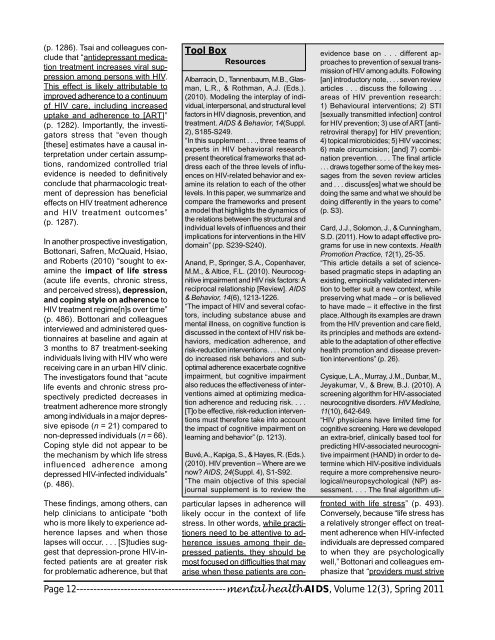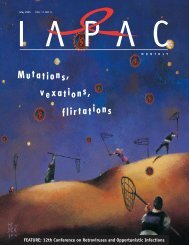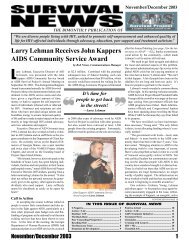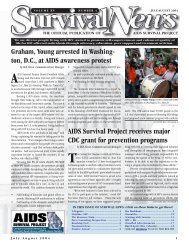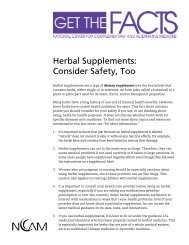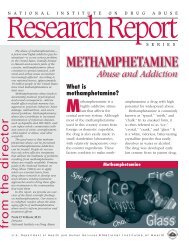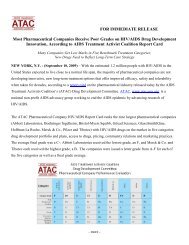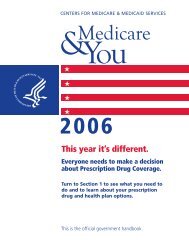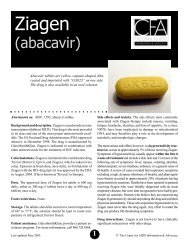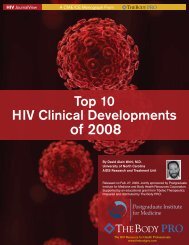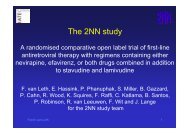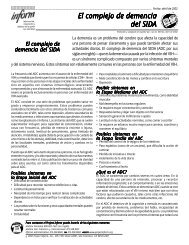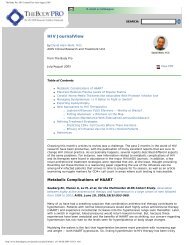Mental Health Aids. Spring 2011. - Substance Abuse and Mental ...
Mental Health Aids. Spring 2011. - Substance Abuse and Mental ...
Mental Health Aids. Spring 2011. - Substance Abuse and Mental ...
Create successful ePaper yourself
Turn your PDF publications into a flip-book with our unique Google optimized e-Paper software.
(p. 1286). Tsai <strong>and</strong> colleagues conclude<br />
that “antidepressant medication<br />
treatment increases viral suppression<br />
among persons with HIV.<br />
This effect is likely attributable to<br />
improved adherence to a continuum<br />
of HIV care, including increased<br />
uptake <strong>and</strong> adherence to [ART]”<br />
(p. 1282). Importantly, the investigators<br />
stress that “even though<br />
[these] estimates have a causal interpretation<br />
under certain assumptions,<br />
r<strong>and</strong>omized controlled trial<br />
evidence is needed to definitively<br />
conclude that pharmacologic treatment<br />
of depression has beneficial<br />
effects on HIV treatment adherence<br />
<strong>and</strong> HIV treatment outcomes”<br />
(p. 1287).<br />
In another prospective investigation,<br />
Bottonari, Safren, McQuaid, Hsiao,<br />
<strong>and</strong> Roberts (2010) “sought to examine<br />
the impact of life stress<br />
(acute life events, chronic stress,<br />
<strong>and</strong> perceived stress), depression,<br />
<strong>and</strong> coping style on adherence to<br />
HIV treatment regime[n]s over time”<br />
(p. 486). Bottonari <strong>and</strong> colleagues<br />
interviewed <strong>and</strong> administered questionnaires<br />
at baseline <strong>and</strong> again at<br />
3 months to 87 treatment-seeking<br />
individuals living with HIV who were<br />
receiving care in an urban HIV clinic.<br />
The investigators found that “acute<br />
life events <strong>and</strong> chronic stress prospectively<br />
predicted decreases in<br />
treatment adherence more strongly<br />
among individuals in a major depressive<br />
episode (n = 21) compared to<br />
non-depressed individuals (n = 66).<br />
Coping style did not appear to be<br />
the mechanism by which life stress<br />
influenced adherence among<br />
depressed HIV-infected individuals”<br />
(p. 486).<br />
These findings, among others, can<br />
help clinicians to anticipate “both<br />
who is more likely to experience adherence<br />
lapses <strong>and</strong> when those<br />
lapses will occur. . . . [S]tudies suggest<br />
that depression-prone HIV-infected<br />
patients are at greater risk<br />
for problematic adherence, but that<br />
Tool Box<br />
Resources<br />
Albarracin, D., Tannenbaum, M.B., Glasman,<br />
L.R., & Rothman, A.J. (Eds.).<br />
(2010). Modeling the interplay of individual,<br />
interpersonal, <strong>and</strong> structural level<br />
factors in HIV diagnosis, prevention, <strong>and</strong><br />
treatment. AIDS & Behavior, 14(Suppl.<br />
2), S185-S249.<br />
“In this supplement . . ., three teams of<br />
experts in HIV behavioral research<br />
present theoretical frameworks that address<br />
each of the three levels of influences<br />
on HIV-related behavior <strong>and</strong> examine<br />
its relation to each of the other<br />
levels. In this paper, we summarize <strong>and</strong><br />
compare the frameworks <strong>and</strong> present<br />
a model that highlights the dynamics of<br />
the relations between the structural <strong>and</strong><br />
individual levels of influences <strong>and</strong> their<br />
implications for interventions in the HIV<br />
domain” (pp. S239-S240).<br />
An<strong>and</strong>, P., <strong>Spring</strong>er, S.A., Copenhaver,<br />
M.M., & Altice, F.L. (2010). Neurocognitive<br />
impairment <strong>and</strong> HIV risk factors: A<br />
reciprocal relationship [Review]. AIDS<br />
& Behavior, 14(6), 1213-1226.<br />
“The impact of HIV <strong>and</strong> several cofactors,<br />
including substance abuse <strong>and</strong><br />
mental illness, on cognitive function is<br />
discussed in the context of HIV risk behaviors,<br />
medication adherence, <strong>and</strong><br />
risk-reduction interventions. . . . Not only<br />
do increased risk behaviors <strong>and</strong> suboptimal<br />
adherence exacerbate cognitive<br />
impairment, but cognitive impairment<br />
also reduces the effectiveness of interventions<br />
aimed at optimizing medication<br />
adherence <strong>and</strong> reducing risk. . . .<br />
[T]o be effective, risk-reduction interventions<br />
must therefore take into account<br />
the impact of cognitive impairment on<br />
learning <strong>and</strong> behavior” (p. 1213).<br />
Buvé, A., Kapiga, S., & Hayes, R. (Eds.).<br />
(2010). HIV prevention – Where are we<br />
now? AIDS, 24(Suppl. 4), S1-S92.<br />
“The main objective of this special<br />
journal supplement is to review the<br />
particular lapses in adherence will<br />
likely occur in the context of life<br />
stress. In other words, while practitioners<br />
need to be attentive to adherence<br />
issues among their depressed<br />
patients, they should be<br />
most focused on difficulties that may<br />
arise when these patients are con-<br />
evidence base on . . . different approaches<br />
to prevention of sexual transmission<br />
of HIV among adults. Following<br />
[an] introductory note, . . . seven review<br />
articles . . . discuss the following . . .<br />
areas of HIV prevention research:<br />
1) Behavioural interventions; 2) STI<br />
[sexually transmitted infection] control<br />
for HIV prevention; 3) use of ART [antiretroviral<br />
therapy] for HIV prevention;<br />
4) topical microbicides; 5) HIV vaccines;<br />
6) male circumcision; [<strong>and</strong>] 7) combination<br />
prevention. . . . The final article<br />
. . . draws together some of the key messages<br />
from the seven review articles<br />
<strong>and</strong> . . . discuss[es] what we should be<br />
doing the same <strong>and</strong> what we should be<br />
doing differently in the years to come”<br />
(p. S3).<br />
Card, J.J., Solomon, J., & Cunningham,<br />
S.D. (2011). How to adapt effective programs<br />
for use in new contexts. <strong>Health</strong><br />
Promotion Practice, 12(1), 25-35.<br />
“This article details a set of sciencebased<br />
pragmatic steps in adapting an<br />
existing, empirically validated intervention<br />
to better suit a new context, while<br />
preserving what made – or is believed<br />
to have made – it effective in the first<br />
place. Although its examples are drawn<br />
from the HIV prevention <strong>and</strong> care field,<br />
its principles <strong>and</strong> methods are extendable<br />
to the adaptation of other effective<br />
health promotion <strong>and</strong> disease prevention<br />
interventions” (p. 26).<br />
Cysique, L.A., Murray, J.M., Dunbar, M.,<br />
Jeyakumar, V., & Brew, B.J. (2010). A<br />
screening algorithm for HIV-associated<br />
neurocognitive disorders. HIV Medicine,<br />
11(10), 642-649.<br />
“HIV physicians have limited time for<br />
cognitive screening. Here we developed<br />
an extra-brief, clinically based tool for<br />
predicting HIV-associated neurocognitive<br />
impairment (HAND) in order to determine<br />
which HIV-positive individuals<br />
require a more comprehensive neurological/neuropsychological<br />
(NP) assessment.<br />
. . . The final algorithm uti-<br />
fronted with life stress” (p. 493).<br />
Conversely, because “life stress has<br />
a relatively stronger effect on treatment<br />
adherence when HIV-infected<br />
individuals are depressed compared<br />
to when they are psychologically<br />
well,” Bottonari <strong>and</strong> colleagues emphasize<br />
that “providers must strive<br />
Page 12--------------------------------------------mental health AIDS, Volume 12(3), <strong>Spring</strong> 2011


